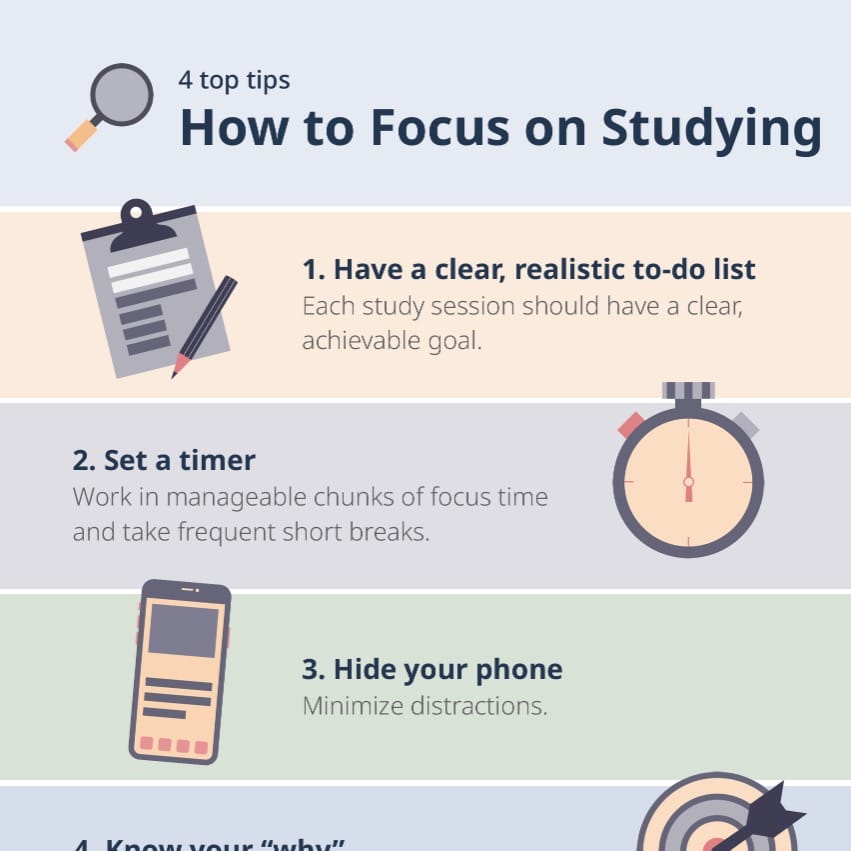When it comes time to sit down and focus on a task, many of us feel defeated when we just can’t seem to get anything done. Learning to focus properly is incredibly important for aspiring nurses because the coursework is challenging and you need to really “buckle down” in order to pass the necessary exams. Not to mention, the exams themselves can be lengthy and complex, so you need to be able to focus well in those moments too.
Today, I’m sharing my top tips for how to stay focused while studying.

FREE Download: 4 Top Tips for flawless focus while studying
How to Focus While Studying: The Top 3 Tips
We’ve all been there – trying to knock out our required readings for a test or sitting through a 2-hour lecture and struggling to focus on what’s happening in front of us.
If you’re someone who has a lot going on (which most of us do), then it’s hard to focus on just one task when your mind is occupied by other potential tasks that need to get done. Our top 3 tips for staying focused are to create a realistic to-do list, set a timer, and hide your phone.
1. Create a realistic to-do list
If you sit down and make a lengthy, complicated list of all of the tasks that you need to get done, then you’re not doing yourself any favors. Nothing interferes with focus more than making yourself feel like you have a huge list of tasks. You’ll feel overwhelmed and it will be hard to focus on one thing because all the other things will be lingering in the back of your mind, taking your focus away. You may even get overwhelmed and shut down completely.
I recommend setting small, manageable goals for your study time. Rather than trying to read five textbook chapters from start to finish, focus on just one chapter or try reviewing the key points of each chapter instead of reading them in their entirety. Instead of trying to write your whole paper in one sitting, start by carving out time for the research phase, then start drafting, and so on. By setting smaller goals, you’ll be able to slowly chip away at what needs to be done, rather than trying to tackle a massive goal head-on.
2. Set a timer
This tip is more formally referred to as The Pomodoro Technique. This focusing method involves utilizing a timer to make the most of your study time. Start by setting the timer for 25 minutes; use this time to focus on a single task without interruption. When the timer goes off, take a 5-minute break. During your break time you can grab a snack or drink, do some stretching, or read a few pages of a book, anything that helps your mind rest a bit. Once your 5-minute break is up, set the timer again for 25 minutes, and get back to studying. Repeat the pattern for 3 or 4 cycles, or until your study time is complete. Some people choose to do a 2-hour time block, but you can just work with however much time you have.
Make sure to give yourself a more significant break once you’ve finished this process. It’s important to give your mind some time to really rest after focusing for so long. Plus, you’ve worked hard, you deserve some leisure time!
3. Hide your phone
Let’s be real, one of the reasons it is so hard to focus these days is due to the invention of the smartphone. Smartphones offer us a lot of great resources right at our fingertips, but they are also a major source of distraction. If you really want to get some serious studying done, then put your phone away. Either turn your notifications off, put it on silent, or just place it in a different room altogether. If you need to be near your phone for a good reason, such as having kids in school or you’re waiting for an important phone call, then set aside designated times when you’ll check your phone. If you use the above method, then you could keep your phone stashed away during your 25-minute working block and check it during your break time.
What to Focus on When Studying for Nursing Exams
It seems a little unfair when a professor assigns 5 textbook chapters as a reading assignment. I mean, do they really expect you to read all of that?! I know I used to try to read all of the assigned reading and I rarely ever got very far with it. When figuring out where to narrow down your studying, you’ll always want to focus on patient safety.
One of the most important parts of being a nurse is having a good sense of judgment and having the ability to think critically on the spot. This is why nursing school is as complicated as it is. Nursing instructors need to make sure that they are training future nurses to make smart decisions when out in the real world working as nurses. This is why nursing school test questions tend to feel tricky, because you may have 4 multiple choice answers that are all correct, you just have to pick the most correct.
So, when you’re studying, always do so with patient safety at the forefront of your mind. Consider how you can apply the information you’re learning to real-life situations and how they relate specifically to the safety of the patient. Rather than reading every single piece of information, read through the chapters with a “filter,” prioritizing patient safety over everything else.
When it comes to delving into textbook chapters, you can also focus on the “key takeaways” or “objectives” at the start or end of the chapter to get an overview of what’s covered in the chapter, rather than attempting to read the entire thing from start to finish. If you’re particularly confused about a certain topic, spend more time delving into the information on that subject.
My Experience With Staying Focused in Nursing School
I was never one of those “naturally focused” types in nursing school. I often found myself feeling lost during lectures and I had a hard time making the most of my study time. There were many times when I spent hours on end studying and getting very little done.
I used the Pomodoro Technique back in nursing school, but back then I didn’t know what it was called! This definitely helped me stay focused. I can also attest to the fact that I got the most done when my phone was not within my immediate vicinity.
I think general self-care is another really important way to stay focused. Make sure you’re eating enough and drinking water. If you’re constantly rushing around, barely eating, and overextending yourself, then you sit down and try to get a bunch of studying done with a huge energy drink in front of you, you might not be very productive! You’ll feel stressed, high-strung, and like your nerves are shot. Taking care of yourself first makes it easier to calmly concentrate on your work, allowing you to be focused and productive.
Also, given that I always focused better when I felt like I could slowly work on smaller tasks, I always tried to get an early start on larger projects. Saving work until the end would just make my life so much more stressful. If I felt like I was ahead, then I was more relaxed and ultimately more focused.
Why Can’t I Focus? Most Common Studying Distractions and How to Overcome Them
It’s quite clear that we live in a distracting world. With smartphones, screens, and the internet offering endless options for entertainment, it’s easy to get off track when you sit down to study. Here are some of the most common study distractions and some methods to avoid them.
1. Social media
As previously stated, just put your phone away when you’re studying. Allow yourself designated phone time during your study breaks to make it less tempting. It makes sense that social media would be super distracting since it offers easy entertainment and a sense of connection with others. If you have a hard time staying off your phone while studying, try getting a fidget toy or stress ball to occupy your hands instead of scrolling on your phone.
2. Other people
Friends and family can be an obvious distraction. It’s hard to get anything done if there is another person talking to you or distracting you. If you live with other people, make sure to get out of your home or find a nice isolated place to study. If you do plan to study with another person, make sure it is someone who will also put their head down and study too. If your study buddy is too talkative, then you may just want to wait and hang out with them when you two are not studying, rather than trying to get work done together.
3. Poor organization
Keep your notes and other study materials neatly organized. Try to have a systematic approach to studying, rather than being all over the place. For example, review your lecture notes, then spend time highlighting the chapters, then do some review questions. Having an organized plan makes it easier to stay on track. Keep your workspace organized as well. Nothing is more distracting than a bunch of clutter surrounding you when you’re trying to think!
As a nursing student, you want to make sure that you’re taking steps to be intentional with your study time in order to stay focused. Establishing a good study routine to help you stay productive and ace your exams.





